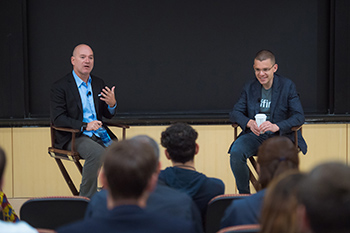PayPal co-founder describes entrepreneurship as

Andrew McAfee (left); Max Levchin. Photo: Gretchen Ertl
Kathryn O’Neill | EECS Contributor
“If you’re going to start a company, do it now,” PayPal co-founder Max Levchin told MIT students during a recent “fireside chat” on campus. Would-be founders should jump in early, he said, because entrepreneurship is a tough enterprise made tougher by the prospect of giving up the comforts of a more traditional career.
“It’s really hard to give the nice life up for more pain,” he noted.
That said, Levchin suggested that an MIT background could help students prepare for the rigors of entrepreneurship. “In school, I remember thinking, ‘I can’t take another hour of study.’ But you learn that you have to study more,” he said during the Oct. 2 event. “Knowing your capacity and how to expand your capacity is directly applicable to entrepreneurship.”
The hour-long discussion, moderated by Andrew McAfee, co-director of the Initiative on the Digital Economy (IDE), gave the audience a chance to hear Levchin’s views on a variety of topics, including diversity in computer science, the character of Silicon Valley, and the future of the banking industry. However, most of the conversation, co-sponsored by IDE and EECS, centered on entrepreneurship.
While a wildly successful serial entrepreneur himself, Levchin nevertheless painted an unvarnished image of the life of a startup founder as one punctuated by “pits of despair” — moments when “we have six weeks of cash; my cofounder just left; and every VC [venture capitalist] has rejected us.”
At that point, McAfee quipped: “I think we’ve frightened everybody off.”
Why does Levchin do it? He said that, for him, entrepreneurship is a calling. “If you do it right, you can change people’s lives for the better. It’s a high-stakes game,” he said. “My goal is to do things that impact the most people positively.”
Best-known for PayPal, the global online payment business that currently has an estimated 240 million users, Levchin has also founded several other businesses (including some that failed), and Slide.com, which made applications for social media.
Despite Slide’s success, spoke about the business with regret, telling the audience at MIT he felt it was a poor fit for his interests: “No part of it grabbed me.”
Today, Levchin is back in financial technology as the CEO of Affirm, a company he co-founded in 2012 to provide consumer financing. He said he’s passionate about finance because the problems are so “fantastically huge” and because “there are so many people who would benefit from great financial services, and so many hurt by bad ones.”
To that end, he advised potential entrepreneurs to stick to their passions. “Working on something hot and sexy that you have no passion for is not a good idea,” he said.
He also recommended finding a partner. “Being a sole founder is a bad idea,” because it’s incredibly difficult to get through the inevitable tough times without support, he said. It’s also important to choose cofounders carefully because the partnership can last decades, he said. “The cofounder relationship is kind of like a marriage.”
Moving beyond entrepreneurship, McAfee asked Levchin to address the question of diversity in computer science, and Levchin offered this hopeful prediction: “I would be blown away if we don’t see a near 50-50 [gender] split in computer science at top schools” within the next few decades.
He said he believes the key to attracting more women and underrepresented minorities to the field is to introduce the idea early — in elementary schools — and to provide role models. “We need more heroes,” he said.
Levchin also suggested reading the book “Brotopia: Breaking Up the Boys’ Club of Silicon Valley,” by journalist Emily Chang, to gain a better understanding of how computer science became so male-dominated.
As for Silicon Valley, he noted that while the entrepreneurial hotspot hasn’t served every group, it continues to have a special dynamism that drives innovation. “The entire Silicon Valley is built on this fiction of ‘it’s crazy, but it might succeed,’” he said in response to a question about the region’s future. “I wouldn’t write it off anytime soon.”
While Silicon Valley was once unique, Levchin said he thinks the world — particularly China — is catching up. “There is effectively an infinite amount of capital in China,” he said. “I think we should worry more about China coming into compete than poaching out.”
The evening wrapped up with Levchin fielding a few banking questions. Notably, he dismissed some of the buzz around blockchain, a digital ledger technology many expect to prove disruptive. “The technology is being compared to the Internet of the ’90s,” he said. “Blockchains are the Internet of the ’70s. It’s the stuff that’s going to inspire the stuff [that’s transformative].”
Media Inquiries
Journalists seeking information about EECS, or interviews with EECS faculty members, should email eecs-communications@mit.edu.
Please note: The EECS Communications Office only handles media inquiries related to MIT’s Department of Electrical Engineering & Computer Science. Please visit other school, department, laboratory, or center websites to locate their dedicated media-relations teams.